302 scholarly books by University College London and 12
have author last names that start with P
302 scholarly books by University College London and 12
302 scholarly books by University College London
12 have author last names that start with P have author last names that start with P
12 have author last names that start with P have author last names that start with P
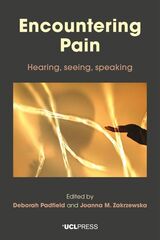
Encountering Pain
Hearing, Seeing, Speaking
Deborah Padfield
University College London, 2020
A unique compilation of voices that speak to the phenomenon of persistent pain and how it can be better communicated.
What is pain—and how do we communicate it? Persistent pain changes the brain and nervous system so that it can no longer warn of danger. However, despite being a major cause of disability globally, pain remains difficult to communicate. As language struggles to bridge the gap between those who suffer from pain and those who are trying to help, this book shares leading research into the potential value of visual images and non-verbal forms of communication as means of improving interactions between clinicians and their patients. Accompanied by vivid photographs co-created with those who live with pain, the volume integrates the voices of leading scientists, academics, and contemporary artists to provide a manual for understanding the meanings of pain for healthcare professionals, pain patients, students, academics, and artists.
What is pain—and how do we communicate it? Persistent pain changes the brain and nervous system so that it can no longer warn of danger. However, despite being a major cause of disability globally, pain remains difficult to communicate. As language struggles to bridge the gap between those who suffer from pain and those who are trying to help, this book shares leading research into the potential value of visual images and non-verbal forms of communication as means of improving interactions between clinicians and their patients. Accompanied by vivid photographs co-created with those who live with pain, the volume integrates the voices of leading scientists, academics, and contemporary artists to provide a manual for understanding the meanings of pain for healthcare professionals, pain patients, students, academics, and artists.
[more]
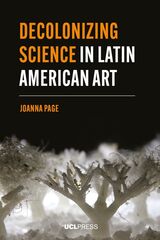
Decolonizing Science in Latin American Art
Joanna Page
University College London, 2021
An assembly of a new corpus of art-science projects by Latin American artists.
Projects that bring the sciences into art are increasingly being exhibited in galleries and museums across the world. In a surge of publications on the subject, few have focused on regions beyond the Global North. This book assembles a new corpus of art-science projects by Latin American artists, ranging from big-budget collaborations with NASA and MIT to homegrown experiments in artists’ kitchens. Page shows how these artworks also “decolonize” science by resisting the exploitation of the natural world that has attended the creation of knowledge in western contexts. Instead, the artists featured in this volume emphasize the subjectivity and intelligence of other species, staging new forms of collaboration and co-creativity beyond the human. Establishing critical dialogues between Western science and indigenous thought, this book interrogates how artistic practices may communicate, extend, supplement, and challenge scientific ideas.
Projects that bring the sciences into art are increasingly being exhibited in galleries and museums across the world. In a surge of publications on the subject, few have focused on regions beyond the Global North. This book assembles a new corpus of art-science projects by Latin American artists, ranging from big-budget collaborations with NASA and MIT to homegrown experiments in artists’ kitchens. Page shows how these artworks also “decolonize” science by resisting the exploitation of the natural world that has attended the creation of knowledge in western contexts. Instead, the artists featured in this volume emphasize the subjectivity and intelligence of other species, staging new forms of collaboration and co-creativity beyond the human. Establishing critical dialogues between Western science and indigenous thought, this book interrogates how artistic practices may communicate, extend, supplement, and challenge scientific ideas.
[more]
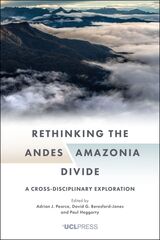
Rethinking the Andes-Amazonia Divide
A Cross-Disciplinary Exploration
Adrian J. Pearce
University College London, 2020
Nowhere on Earth is there an ecological transformation so swift and so extreme as between the snow line of the high Andes and the tropical rainforest of Amazonia. Because of that, the different disciplines that research the human past in South America have tended to treat these two great subzones of the continent as self-contained enough to be studied independently of each other. Objections to that approach have repeatedly been raised, however, warning against imagining too sharp a divide between the people and societies of the Andes and Amazonia when there are clear indications of significant connections and transitions between them.
Rethinking the Andes-Amazonia Divide brings together archaeologists, linguists, geneticists, anthropologists, ethnohistorians, and historians to explore both correlations and contrasts in how the various disciplines see the relationship between the Andes and Amazonia, from deepest prehistory up to the European colonial period. This collaboration has emerged from an innovative program of conferences and symposia conceived to generate discussion and cooperation across the divides between disciplines.
Rethinking the Andes-Amazonia Divide brings together archaeologists, linguists, geneticists, anthropologists, ethnohistorians, and historians to explore both correlations and contrasts in how the various disciplines see the relationship between the Andes and Amazonia, from deepest prehistory up to the European colonial period. This collaboration has emerged from an innovative program of conferences and symposia conceived to generate discussion and cooperation across the divides between disciplines.
[more]
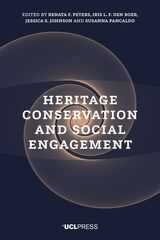
Heritage Conservation and Social Engagement
Renata F. Peters
University College London, 2020
Heritage Conservation and Social Engagement explores different kinds of engagement, participation, access, and creative use of resources motivated by the practice of conservation; and offers ethical and practical perspectives from which to approach cultural heritage projects by exploring the complexities of cross-disciplinary collaborations. Such collaborations are often influenced by the colonial baggage of museums, and their effectiveness can vary based on context, objectives, methods, and available resources. However, efforts to promote inclusion and engagement through museum collections and the broader heritage sector are becoming even more socially relevant. The heritage sector has tools and ability to help fight prejudices that are invariably based on misinformation or manipulation of facts, and this book joins those efforts, in the understanding that nothing can be done without dialogue and engagement.
[more]

Wastiary
A Bestiary of Waste
Michael Picard
University College London, 2023
A heterodox compendium of “beasts of waste,” playfully re-imagining the medieval treatise on various kinds of animals.
Wastiary: A Bestiary of Waste is a creative exercise that occupies letters, numbers, and symbols of Western academic language to compose a list of thirty-five short entries on the uncomfortable but pressing topic of waste in the contemporary world. The collection is richly illustrated with artwork, photography, collage, and mixed media and conveys the message that various forms of waste and pollution have achieved a beast-like or untamable quality, at times pungently transferring to considerations of “the human,” or humans treated as waste.
Wastiary: A Bestiary of Waste is a creative exercise that occupies letters, numbers, and symbols of Western academic language to compose a list of thirty-five short entries on the uncomfortable but pressing topic of waste in the contemporary world. The collection is richly illustrated with artwork, photography, collage, and mixed media and conveys the message that various forms of waste and pollution have achieved a beast-like or untamable quality, at times pungently transferring to considerations of “the human,” or humans treated as waste.
[more]
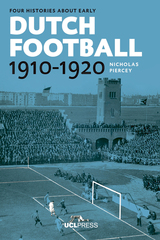
Four Histories about Early Dutch Football, 1910-1920
Constructing Discourses
Nicholas Piercey
University College London, 2016
What is the purpose of history today, and how can sporting research help us understand the world around us? In this stimulating book, Nicholas Piercey constructs four new histories of early Dutch football, exploring urban change, club members, the media, and the diaries of Cornelis Johannes Karel van Aalst, a stadium director, to propose practical examples of how history can become an important democratic tool for the 21st century. Using early Dutch football as a field for experimental thinking about the past, the four histories offer new insights into the lives, interests and passions of those connected to the sport in the 1910s and the cities they lived in. How did the First World War impact on Dutch football? Were new stadia a form of social control? Is the spread of the beautiful game really a good thing? And why was one of the sport’s most prominent figures more concerned with potatoes? These stories of early Dutch football suggest how vital sport and history can be in shaping our lives, perceptions and actions, and why we need to challenge the influence they have today. This book also includes a downloadable appendix. Download it here(.xlsx).
[more]
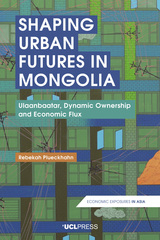
Shaping Urban Futures in Mongolia
Ulaanbaatar, Dynamic Ownership and Economic Flux
Rebekah Plueckhahn
University College London, 2019
Shaping Urban Futures in Mongolia discusses the lived experience of urban development, redevelopment, and change in Ulaanbaatar. The fast rates of urbanization occurring in many parts of the world are often buoyed by increased investment of capital and ensuing construction, giving rise to other less visible effects among those living in cities—including diverse economic practices, politics, and ethics. Construction becomes a solution to the provision of housing but also simultaneously becomes a problem when economic processes fail to work as they should, or people are dispossessed of land to make way for further urban change.
Rebekah Plueckhahn explores the inherent contradiction between solution and problem-making as experienced by residents of Ulaanbaatar during a tumultuous period in Mongolia’s economic history. She examines the ways residents attempt to own forms of real estate and, in turn, physically shape the city and its politics and urban economic forms from within. This book interlinks the intimate space of the home with ideologies of the national economy, urban development and disrepair and the types of politics and ethics that arise as a result.
Rebekah Plueckhahn explores the inherent contradiction between solution and problem-making as experienced by residents of Ulaanbaatar during a tumultuous period in Mongolia’s economic history. She examines the ways residents attempt to own forms of real estate and, in turn, physically shape the city and its politics and urban economic forms from within. This book interlinks the intimate space of the home with ideologies of the national economy, urban development and disrepair and the types of politics and ethics that arise as a result.
[more]
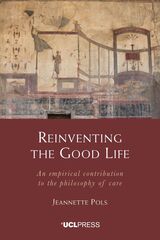
Reinventing the Good Life
An Empirical Contribution to the Philosophy of Care
Jeannette Pols
University College London, 2023
An analytical exploration of what it means to live a good life.
Ever since Adam Smith’s musings on “the invisible hand” became more famous than his work on moral sentiments, social theorists started to pay less attention to everyday ethics and aesthetics. Smith’s metaphor of the invisible hand posits that social outcomes emerge by dint of the behaviors of individuals rather than their intentions or virtues.
Modernist and scientific approaches to determining the common good or good forms of governance have increasingly relied on techniques of generalization, rationalization, and universalization. Everyday ethics and aesthetics—and recently also matters of truth—came to be regarded as individual matters of taste. This shift, however, has meant that we no longer comprehend why and how people display a deep concern with everyday life values in their social practices. People continue to enact these values and live by them while academics lack the vocabulary and methods to grasp them.
By reconstructing the history of ideas about everyday-life values, and by analyzing the role of such values in contemporary care practices for patients with chronic disease in the Netherlands, Reinventing the Good Life seeks to explore new ways to study the values of everyday life, particularly in situations where the achievement of a clear-cut or uniform good is unlikely. The book presents a practice-based epistemology and methodology for studying everyday care practices and supporting their goodness. This analytical approach ultimately aims to generate ideas that will allow us to relate in more imaginative ways to the many pressing concerns that we are forced to live with today.
Ever since Adam Smith’s musings on “the invisible hand” became more famous than his work on moral sentiments, social theorists started to pay less attention to everyday ethics and aesthetics. Smith’s metaphor of the invisible hand posits that social outcomes emerge by dint of the behaviors of individuals rather than their intentions or virtues.
Modernist and scientific approaches to determining the common good or good forms of governance have increasingly relied on techniques of generalization, rationalization, and universalization. Everyday ethics and aesthetics—and recently also matters of truth—came to be regarded as individual matters of taste. This shift, however, has meant that we no longer comprehend why and how people display a deep concern with everyday life values in their social practices. People continue to enact these values and live by them while academics lack the vocabulary and methods to grasp them.
By reconstructing the history of ideas about everyday-life values, and by analyzing the role of such values in contemporary care practices for patients with chronic disease in the Netherlands, Reinventing the Good Life seeks to explore new ways to study the values of everyday life, particularly in situations where the achievement of a clear-cut or uniform good is unlikely. The book presents a practice-based epistemology and methodology for studying everyday care practices and supporting their goodness. This analytical approach ultimately aims to generate ideas that will allow us to relate in more imaginative ways to the many pressing concerns that we are forced to live with today.
[more]
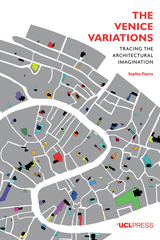
Venice Variations
Tracing the Architectural Imagination
Sophia Psarra
University College London, 2018
From the myth of Arcadia through to the twenty-first century, ideas about sustainability—how we imagine better urban environments—remain persistently relevant and raise recurring questions. How do cities evolve as complex spaces nurturing both urban creativity and the fortuitous art of discovery, and by which mechanisms do they foster imagination and innovation? While past utopias were conceived in terms of an ideal geometry, contemporary exemplary models of urban design seek technological solutions of optimal organization. The Venice Variations explores Venice as a prototypical city that may hold unique answers to the ancient narrative of utopia. Venice was not the result of a preconceived ideal but the pragmatic outcome of social and economic networks of communication. Its urban creativity, though, came to represent the quintessential combination of place and institutions of its time.
Through a discussion of Venice and two other works owing their inspiration to this city—Italo Calvino’s Invisible Cities and Le Corbusier’s Venice Hospital—Sophia Psarra describes Venice as a system that starts to resemble a highly probabilistic "algorithm." The rapidly escalating processes of urban development around our big cities share many of the motivations for survival, shelter, and trade that brought Venice into existence. Rather than seeing these places as problems to be solved, we need to understand how urban complexity can evolve, as happened from its unprepossessing origins in the marshes of the Venetian lagoon to the "model city" enduring a thousand years. This book frees Venice from stereotypical representations, revealing its generative capacity to inform potential other "Venices" for the future.
Through a discussion of Venice and two other works owing their inspiration to this city—Italo Calvino’s Invisible Cities and Le Corbusier’s Venice Hospital—Sophia Psarra describes Venice as a system that starts to resemble a highly probabilistic "algorithm." The rapidly escalating processes of urban development around our big cities share many of the motivations for survival, shelter, and trade that brought Venice into existence. Rather than seeing these places as problems to be solved, we need to understand how urban complexity can evolve, as happened from its unprepossessing origins in the marshes of the Venetian lagoon to the "model city" enduring a thousand years. This book frees Venice from stereotypical representations, revealing its generative capacity to inform potential other "Venices" for the future.
[more]

Parliament Buildings
The Architecture of Politics in Europe
Sophia Psarra
University College London, 2023
An interdisciplinary study of how the physical space of parliament buildings influences politics.
As political polarization undermines confidence in the shared values and established constitutional orders of many nations, it is imperative that we explore how parliaments are to stay relevant and accessible to the citizens whom they serve. The rise of modern democracies is thought to have found physical expression in the staged unity of the parliamentary seating plan. However, the built forms alone cannot give sufficient testimony to the exercise of power in political life.
Parliament Buildings brings together architecture, history, art history, history of political thought, sociology, behavioral psychology, anthropology, and political science to raise a host of challenging questions. How do parliament buildings give physical form to norms and practices, behaviors, rituals, identities, and imaginaries? How are their spatial forms influenced by the political cultures they accommodate? What kinds of histories, politics, and morphologies do the diverse European parliaments share, and how do their political trajectories intersect?
This volume offers an eclectic exploration of the complex nexus between architecture and politics in Europe. Including contributions from architects who have designed or remodeled four parliament buildings in Europe, it provides the first comparative, multi-disciplinary study of parliament buildings across Europe and across history.
As political polarization undermines confidence in the shared values and established constitutional orders of many nations, it is imperative that we explore how parliaments are to stay relevant and accessible to the citizens whom they serve. The rise of modern democracies is thought to have found physical expression in the staged unity of the parliamentary seating plan. However, the built forms alone cannot give sufficient testimony to the exercise of power in political life.
Parliament Buildings brings together architecture, history, art history, history of political thought, sociology, behavioral psychology, anthropology, and political science to raise a host of challenging questions. How do parliament buildings give physical form to norms and practices, behaviors, rituals, identities, and imaginaries? How are their spatial forms influenced by the political cultures they accommodate? What kinds of histories, politics, and morphologies do the diverse European parliaments share, and how do their political trajectories intersect?
This volume offers an eclectic exploration of the complex nexus between architecture and politics in Europe. Including contributions from architects who have designed or remodeled four parliament buildings in Europe, it provides the first comparative, multi-disciplinary study of parliament buildings across Europe and across history.
[more]
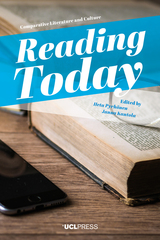
Reading Today
Heta Pyrhönen
University College London, 2018
Today we’re just as, if not more, likely to scroll, click, and tap the cold, shiny screen of a laptop, tablet, or smartphone as we are to turn the pages of a book. How has the advent of new technologies changed the way we read? Do our devices encourage quick and cursory reading? Is the experience of reading becoming “flatter” alongside the devices themselves? How have our conceptions changed of what reading is?
With Reading Today, Heta Pyrhönen and Janna Kantola have assembled contributions that respond to these questions and many more. The contributors unpack emerging strategies of reading. They consider, for example, how paying attention to our emotional reactions while reading can significantly affect how we experience the process. Other chapters consider the impacts of technology on reading through such topics as experimental literature, the contemporary encyclopedic novel, and the healing power of books.
With Reading Today, Heta Pyrhönen and Janna Kantola have assembled contributions that respond to these questions and many more. The contributors unpack emerging strategies of reading. They consider, for example, how paying attention to our emotional reactions while reading can significantly affect how we experience the process. Other chapters consider the impacts of technology on reading through such topics as experimental literature, the contemporary encyclopedic novel, and the healing power of books.
[more]
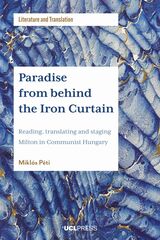
Paradise from behind the Iron Curtain
Reading, Translating and Staging Milton in Communist Hungary
Miklós Péti
University College London, 2022
The role and reception of Milton’s work in Communist Hungary.
This book provides a detailed survey of the key responses to Milton’s work in Hungarian state socialism. The four decades between 1948 and 1989 saw a radical revision of previous critical and artistic positions and resulted in the emergence of some characteristically Eastern European responses to Milton’s works. Appraisals of Milton’s works in the communist era proved more controversial than receptions of other major Western authors: on the one hand, Milton’s participation in the Civil War earned him the title of a “revolutionary hero,” on the other hand, religious aspects of his works were often disregarded and sometimes proactively suppressed. This book highlights these diverging responses and places them in the wider context of socialist cultural policy. In addition, it presents the full Hungarian script of the 1970 theatrical performance of Milton’s Paradise Lost, the first of its kind since the work’s publication, alongside a parallel English translation, enabling a deeper reflection on Milton’s original theodicy and its possible interpretations in communist Hungary.
This book provides a detailed survey of the key responses to Milton’s work in Hungarian state socialism. The four decades between 1948 and 1989 saw a radical revision of previous critical and artistic positions and resulted in the emergence of some characteristically Eastern European responses to Milton’s works. Appraisals of Milton’s works in the communist era proved more controversial than receptions of other major Western authors: on the one hand, Milton’s participation in the Civil War earned him the title of a “revolutionary hero,” on the other hand, religious aspects of his works were often disregarded and sometimes proactively suppressed. This book highlights these diverging responses and places them in the wider context of socialist cultural policy. In addition, it presents the full Hungarian script of the 1970 theatrical performance of Milton’s Paradise Lost, the first of its kind since the work’s publication, alongside a parallel English translation, enabling a deeper reflection on Milton’s original theodicy and its possible interpretations in communist Hungary.
[more]
READERS
Browse our collection.
PUBLISHERS
See BiblioVault's publisher services.
STUDENT SERVICES
Files for college accessibility offices.
UChicago Accessibility Resources
home | accessibility | search | about | contact us
BiblioVault ® 2001 - 2024
The University of Chicago Press









